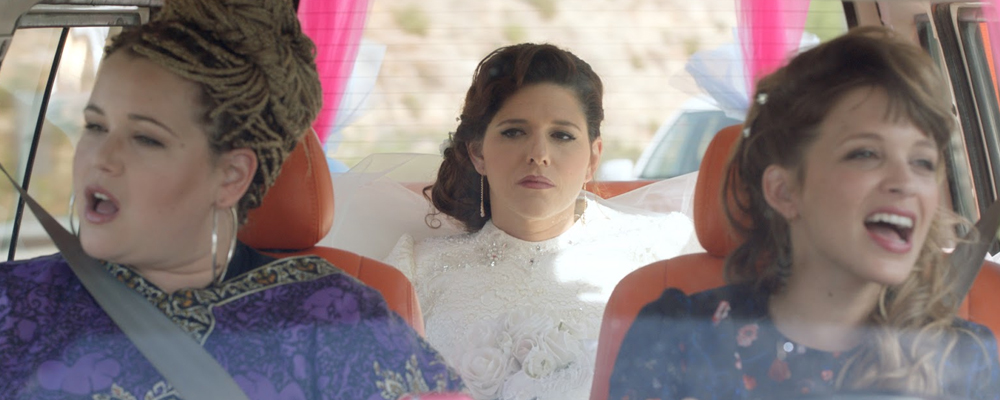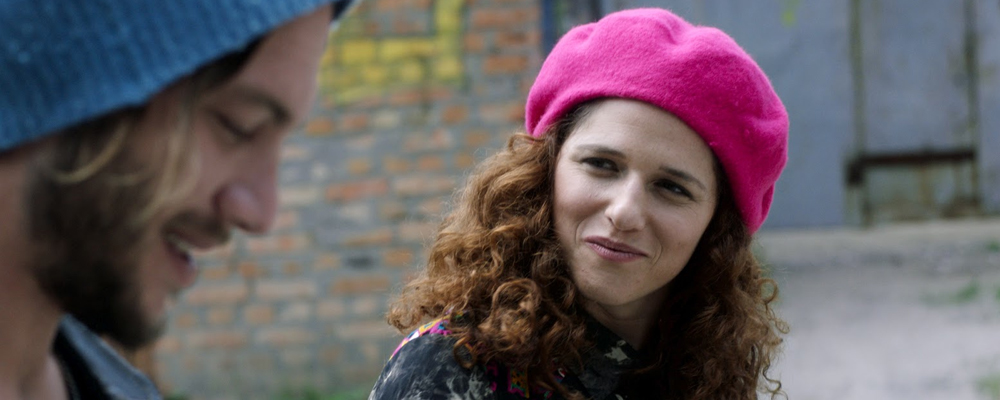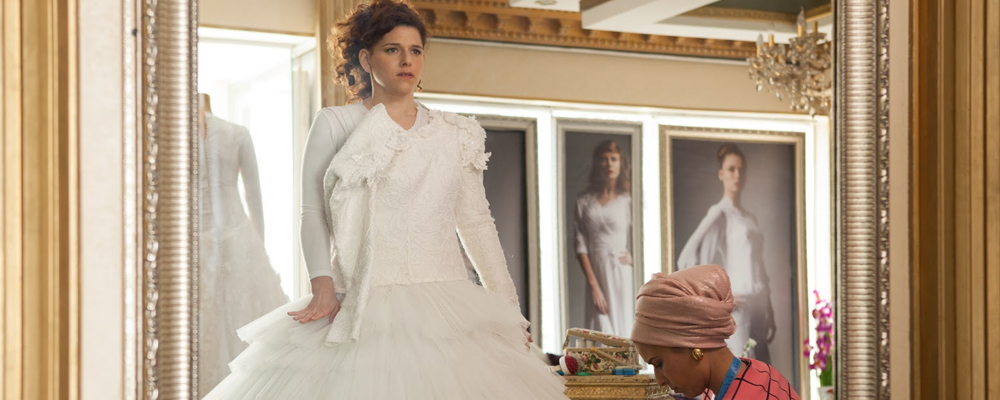Filmmaker Rama Burshtein Talks ‘The Wedding Plan’ and the Universality of Finding Love
Sandra Miska
Over four years after making waves with her feature debut “Fill the Void,” a drama about a young Orthodox Jewish woman who is pushed to marry her sister’s widower, Israeli filmmaker Rama Burshtein returns with a lighter, but equally moving film about a woman looking to marriage, “The Wedding Plan.” Newcomer Noa Koler stars as Michal, a 32-year-old Orthodox Jewish woman who is blindsided after her fiancé (Erez Drigues) announces one month before their wedding date that he doesn’t love her. Instead of returning her wedding dress and giving up her reservation at the reception hall, Michal decides to push forward with her planning, having faith that she will find a groom in mere weeks.
Despite both of her film being centered on women on the verge of matrimony, Burshtein, who, like Michal, grew up in a secular Jewish family but chose to become Orthodox as an adult, explained to Entertainment Voice that it never was her intention to focus on weddings. “I would say [my films are] more about looking for love, but in my world, you have to get married for that. But they’re just love stories, so they’re more about that than marriage. That’s what interested me before I became religious; that’s what interests me today, that enigma in a relationship between a man and a woman.”
Adding to Michal’s quirkiness is her unusual profession, as she runs a mobile petting zoo. In one memorable scene in which she visits an Orthodox girls’ school, the teacher looks at her and her snake in disgust, afterward rudely asking her what man would marry her with such a job. Burshtein explained how she gave Michal this career to illustrate her outsider status. “When someone becomes religious like me – I chose that world when I was 27 years old. I was totally secular – you come with the whole baggage. My family was very far away from religion… I had already finished studying and everything. What do you do with everything you have? With the petting zoo, this was what she did when she became religious. In the religious community, they don’t like to touch those animals. They invite her, and she stands like Snow White with the snake and everything, and all they want is to be scared of it. They don’t want to touch it. [Her job] shows that someone who becomes religious is different than some who is religious from birth.”
In her quest to find a husband, Michal goes on a series of mostly awkward dates, the most memorable involving an otherwise promising suitor who refuses to look at her throughout dinner. “It was fun to write [the dates],” revealed Burshtein. “That’s my world. There’s a lot of men who don’t look for very amazing [reasons], my husband even. It’s like, they will always be some more beautiful, a bit smarter, more funny than me. Not because I’m not funny and beautiful. Because there’s always going to be someone, out of seven million people, that will be more than me, and my husband, he wants to make sure that he doesn’t play with me. I am the woman. In order for me to be the woman, he looks only at me. The other women in his life are his mother, his daughter and his sister. He would look at it sometimes from the outside and say, ‘This is so primitive.’ You deal with everything that kind of tempts you. We think that it’s not that smart, because it will tempt you. If you really want to hold the family, the marriage, the love, then this is your sacrifice. I don’t have to sacrifice; I look at men. But he sacrifices that because he wants to look at all the women in the world. He’s alive and he’s delicate, and he wants to see all the women, but he gives that up for me. It’s beautiful. This guy in the film, he took it one step further, and it was not real what he did, because when she came and said, ‘Just give me that one look and we’ll go for it.’ He just didn’t look at her and he wouldn’t do that, so that means he wasn’t serious. That’s why he’s not the guy… but I do believe in that way. I think it’s a beautiful way of holding a relationship, but he went with it a bit too far.”
With “Fill the Void,” Burshtein became the first Orthodox Jewish woman to make a film that was intended to be viewed outside of the Orthodox community. She explained that she didn’t worry about anything being lost in translation to those not familiar with Orthodox dating and marriage rituals, as the themes are universal. “I have to think storytelling. I don’t even think about this, but I know it’s not so different with all the J-Dates and [everything]. It’s a blind date. You kind of text before and you meet, and it’s going to go to whatever next stage, or it’s not going to go. I have a lot of secular, unfortunately, friends, women who are not married and have not found love and they go on date after date and it’s not working…. It’s the same. The only difference is that in my world, the guys really come to meet a woman for the real thing, not for, like, having fun, not for sex… It’s not really different. A relationship is a man and woman sitting and talking. This is what it is everywhere, anyway. It’s a first date. I think this is why people relate to it not just in Israel, because it’s international in terms of looking for love.”
Over the course of her month-long search, Michal finds herself drawn to two very different men. The first is Shimi (Amos Tamam), the married owner of the catering hall who lends a listening ear. The second is heartthrob Yos (Oz Zehavi), a secular musician whom she meets while on a pilgrimage to the tomb of a famous rabbi in Ukraine. In a rather unique meet-cute, the two make a connection before even setting eyes on each other, speaking through a wall separating men and women and this holy site.
Music plays an important role in “The Wedding Plan,” and Burshtein spoke about the importance of choosing music when making the film. “The musician is the one I casted before everyone else, because when I have to convince people to put money in my films, I have to bring something from my world in a documentary way for them to understand. Even‘Fill the Void’ had a four-minute documentary, and with that we got the money. It’s very hard to picture the world I’m portraying because you don’t know it. This film, which is different from “Fill the Void,” I did a clip of the footage of my wedding. My husband became religious, and I became religious like Michal did, and it’s a very different kind of wedding. So, I was looking for a song for the clip. So I was looking, looking, looking and came up just by miracle came to the song that was beautiful. It’s the song [played] when she goes to the wedding with the drums when she’s in the car. That’s the song I heard and I said, ‘That’s the song for my clip.’ Immediately, I got together with the musician and the meeting [went so well] between us, I just knew he was the musician. He did the score and the song. His name is Roy Edri and he’s very, very talented.”
Although the film is primarily about a woman finding a man, “The Wedding Plan” has a strong theme about the importance of female relationships: Michal’s support system is almost exclusively made up of women, including female relatives and her best friend, Feggie (Ronny Merhavi), who stand by her even when they feel baffled and even exasperated by her behavior. “I think one of the biggest, the strongest, one of the most powerful things for me [when I chose] my religion was the girl power,” divulged Burshtein. “The girl power is very, very strong for us. I’ll give you an example. It’s a beautiful story. Not long ago after the film was out there was another very big screening for a teacher for the study of Judaism, a woman, an amazing woman, [and afterwards] there was a Q and A with both of us talking about marriage, talking about relationships between men and women, and the thing was for women. There was, like, 450 women. One of the producers in the company that I work with, she’s totally secular, she was there, and there came a point where this other woman said to all those 450, said, ‘Let’s pray for all the women here who didn’t find their partner, didn’t find their love. Let’s pray together.’ And this producer, a friend of mine, she’s 40 years old and hadn’t found a guy. I told the lady, I said, ‘Please say my friend’s name. Please pray for Tami.’ And she said [her name], and Tami didn’t know, and everyone was going, ‘Amen!’ And she started crying, but it was like a life-changing cry, very strong. And she’s going to get married now. Do you believe this? That’s how strong it was, the movement in her heart. This was girl power. You don’t get that at all when it’s a mixed crowd. You get that only from women. When you’re religious, you live in a world of women. Men live in their own world, and we live in our own world, and they don’t mix in general. I mix with my husband and my kids and my family, but it’s a different kind of party, and we keep that, so we can dance and do all [sorts of] things without the men looking and interfering.”
Bushtein searched long and hard when casting Michal, and her efforts paid off with Koler, who gives a touching, nuanced performance. The director detailed her casting process this time around, revealing she had an easier time finding an actress to play an 18-year-old in “Fill the Void.” “With this character, it was different, because she’s a very complicated character. She had to move you and make you laugh at the same time. She had to be a professional actress, and it’s very hard to find at this age someone who people don’t know [who is] so, so good. And I was lucky, and [Koler] walked in and, and everyone in the industry, they all knew that she was very talented, but nobody gambled on her. Nobody gave her a leading role. It’s crazy because she’s amazing. I can’t explain. Nobody can. It was amazing kind of discovering this genius at the age of 35. She started her career at the age of 35. She went through her own wall, and today she’s doing leading roles in films… She could do everything I wanted. That’s very hard to find… It was an amazing process.”
With two feature films under he belt, Burshtein now looks to a different medium. “I think the next step is television because today television is not like it used to be. Today, [series are like] a long film, they can go into the characters and still stay very cinematic and very artistic. It’s not like you need TV actors today. All actors do everything, in Israel too… It’s very different budgets, very small budgets in Israel, which makes us more creative because of that. Today, there are a lot of co-productions that are happening. There are [multiple] shows from Israel that were brought here, like ‘In Treatment’ [was based off an Israeli series]. Today you can have the co-productions between the countries.”
“The Wedding Plan” opens May 12 in New York, May 19 in Los Angeles.



